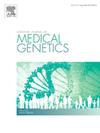Short-term efficacy of tofacitinib, a JAK inhibitor, in IFIH1-related Aicardi-Goutières syndrome
IF 1.7
4区 医学
Q3 GENETICS & HEREDITY
引用次数: 0
Abstract
Aicardi-Goutières syndrome (AGS) is a genetically heterogeneous type-I interferonopathy presenting in infancy with intracranial calcifications, white matter lesions, and brain atrophy. AGS7, caused by gain-of-function (GOF) mutations in the IFIH1 gene, triggers excessive type-I interferon production, leading to autoimmune responses. We describe an 18-year-old female diagnosed with AGS7 due to a somatic GOF mutation in IFIH1. In 2014, she presented with multiple joint swelling, facial rash, and hair loss, and received a diagnosis of juvenile idiopathic arthritis and systemic lupus erythematosus. Traditional immunosuppressants were administered, but provided little benefit. Genetic testing in 2023 revealed a GOF variant (p.R720G) in IFIH1. Given the link between IFIH1 variants and the Janus kinase (JAK)-signal transducer and activator of transcription (STAT) pathway, we administered tofacitinib (a JAK inhibitor) and oral methylprednisolone, with tapering of the traditional immunosuppressants. After nearly one year, the patient showed no significant disease activity and normal hair growth, with no notable changes in thyroid function. Although treatment of AGS remains challenging, this case suggests tofacitinib can successfully manage AGS7 symptoms. More clinical studies are needed to verify the long-term safety and efficacy of tofacitinib.
JAK抑制剂tofacitinib治疗ifil1相关aicardii - gouti综合征的短期疗效
aicardii - gouti综合征(AGS)是一种遗传异质性的i型干扰素病,表现为婴儿期颅内钙化、白质病变和脑萎缩。由IFIH1基因的功能获得(GOF)突变引起的AGS7触发过量的i型干扰素产生,导致自身免疫反应。我们描述了一名18岁的女性,由于IFIH1的体细胞GOF突变而被诊断为AGS7。2014年,患者出现多发关节肿胀、面部皮疹、脱发,诊断为青少年特发性关节炎和系统性红斑狼疮。使用了传统的免疫抑制剂,但收效甚微。2023年基因检测显示IFIH1中存在GOF变异(p.R720G)。考虑到IFIH1变异与Janus激酶(JAK)-信号转导和转录激活因子(STAT)途径之间的联系,我们给药tofacitinib(一种JAK抑制剂)和口服甲基强龙,并逐渐减少传统的免疫抑制剂。近一年后,患者无明显疾病活动,毛发生长正常,甲状腺功能无明显变化。尽管AGS的治疗仍然具有挑战性,但该病例表明托法替尼可以成功地控制AGS7症状。需要更多的临床研究来验证托法替尼的长期安全性和有效性。
本文章由计算机程序翻译,如有差异,请以英文原文为准。
求助全文
约1分钟内获得全文
求助全文
来源期刊
CiteScore
4.10
自引率
0.00%
发文量
193
审稿时长
66 days
期刊介绍:
The European Journal of Medical Genetics (EJMG) is a peer-reviewed journal that publishes articles in English on various aspects of human and medical genetics and of the genetics of experimental models.
Original clinical and experimental research articles, short clinical reports, review articles and letters to the editor are welcome on topics such as :
• Dysmorphology and syndrome delineation
• Molecular genetics and molecular cytogenetics of inherited disorders
• Clinical applications of genomics and nextgen sequencing technologies
• Syndromal cancer genetics
• Behavioral genetics
• Community genetics
• Fetal pathology and prenatal diagnosis
• Genetic counseling.

 求助内容:
求助内容: 应助结果提醒方式:
应助结果提醒方式:


